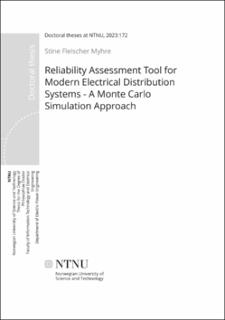Reliability Assessment Tool for Modern Electrical Distribution Systems – A Monte Carlo Simulation Approach
Doctoral thesis
Permanent lenke
https://hdl.handle.net/11250/3067618Utgivelsesdato
2023Metadata
Vis full innførselSamlinger
- Institutt for elkraftteknikk [2468]
Sammendrag
The electrical power system is under constant development, and multiple changes will occur in the upcoming years, leading to a more intelligent and active system with the integration of ICT, distributed generation, and flexible resources. The increased complexity obtained through the modernization of the power system raises a pressing need for appropriate tools and approaches to assess the power system’s reliability.
As a response, the RELSAD—RELiability tool for Smart and Active Distribution networks, a framework constructed as a reliability assessment tool for calculating and evaluating the reliability of modern distribution systems, is proposed in this thesis. RELSAD is an extensive tool, developed as a Python package and published in the Journal of Open Source Software (JOSS), that takes the new behavior and components in the distribution system into account. The complexity of traditional as well as Cyber-Physical Distribution Systems (CPDS) is modeled in the tool through a highly customizable object-oriented framework. The developed sequential Monte Carlo simulation tool facilitates the reliability assessment of complex systems with a great level of detail.
Three studies addressing important aspects seen in modern distribution systems have been conducted using the developed simulation tool:
1. In the first study, an investigation of a distribution network with an embedded microgrid including renewable energy sources and a battery was conducted. The study addressed how the microgrid affects the reliability of both the distribution network and the microgrid when the microgrid participates actively during outages in the system. The reliability is evaluated based on variations of microgrid placement, operation mode, and battery capacity. Additionally, the study includes a comprehensive sensitivity analysis to map how the microgrid battery capacity, power line repair time, and power line failure rate affects the reliability from both system perspectives. The study results in a suggestion for optimal conditions for minimizing the impact on the microgrid while maximizing the contributions to the distribution system. Additionally, it emphasizes the that the reliability impact of the microgrid is highly dependent on system size and load priority.
2. The second study investigated the impact of Vehicle-to-Grid (V2G) on the reliability of a modern distribution network. The study proposes new reliability indices that aim to highlight the impact on the EVs in the network when they are providing V2G services. Additionally, a comprehensive sensitivity study of the reliability indices is conducted to analyze the reliability impacts. The results revealed that EVs can offer good reliability support for failures that result in short outages of the system. The sensitivity analysis demonstrated that the charging capacity and the number of available EVs in the network have a great impact on the reliability support. The proposed indices provided valuable insight from the EV perspective and illustrated that an EV was expected to be used rarely and for relatively short periods during a year, resulting in low wear on the battery of the EVs.
3. The third study investigated the impact on the reliability of a CPDS in terms of survivability quantification. The results from this study show clear reliability improvements in the distribution system when ICT was implemented. However, the study also illustrated that the reliability could be worsened when the ICT system did not function properly.
The developed reliability assessment tool has many possible applications related to the evaluation of distribution system reliability as illustrated in the performed case studies. The development and open-source publication of RELSAD lay the foundation for further open and transparent research improving the reliability assessment of modern distribution systems. By sharing the source code publicly, RELSAD can be validated and further developed by researchers and users, resulting in a higher-quality tool.
Består av
Paper 1: Myhre, Stine Fleischer; Fosso, Olav B; Heegaard, Poul Einar; Gjerde, Oddbjørn. RELSAD: A Python package for reliability assessment of modern distribution systems. Journal of Open Source Software (JOSS) 2022 ;Volum 7.(78) s. - Authors of papers retain copyright and release the work under a Creative Commons Attribution 4.0 International License (CC BY 4.0).Paper 2: Myhre, Stine Fleischer; Fosso, Olav B; Gjerde, Oddbjørn; Heegaard, Poul Einar. Reliability Assessment for Distribution Systems with Embedded Microgrids. Submitted for publication. Preprint DOI: https://doi.org/10.48550/arXiv.2111.07674
Paper 3: Myhre, Stine Fleischer; Fosso, Olav B; Gjerde, Oddbjørn; Heegaard, Poul Einar. A Study on V2G impact on the Reliability of Modern Distribution Networks. Submitted for publication. Preprint DOI: https://doi.org/10.48550/arXiv.2302.10069
